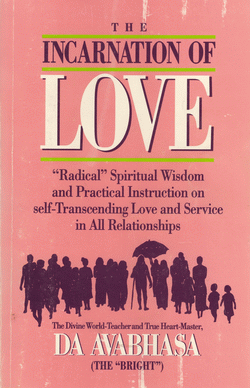In the Beezone Library

“Radical” Spiritual Wisdom and Practical Instruction on Self-Transcendending Love and Service in All Relationships
By The Divine World-Teacher and True Heart-Master, Da Avabhasa (The “Bright”).
First edition: 10/93.
a nonprofit (501(c)3) educational foundation
In the Beezone Library

“Radical” Spiritual Wisdom and Practical Instruction on Self-Transcendending Love and Service in All Relationships
By The Divine World-Teacher and True Heart-Master, Da Avabhasa (The “Bright”).
First edition: 10/93.